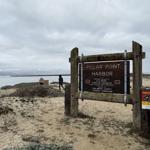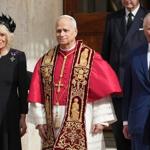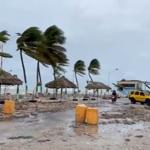U.S. President Donald Trump has wrapped up one of the busiest days of his Asia trip, meeting with Japan's new ultraconservative Prime Minister Sanae Takaichi, speaking to U.S. troops and mingling with business leaders. Next up is South Korea and a much-anticipated face-to-face meeting with Chinese President Xi Jinping.
Meanwhile, his defense secretary announced four more air strikes off the coast of Colombia, killing 14 people on boats he says were carrying drugs. The government shutdown now has food banks struggling, and the ICE crackdown is traumatizing children in Chicago.
Here's the latest:
Window-shopping — and sticker shock — for health plans delayed
Democrats insist that before they agree to fund the government, Republicans must agree to extend federal subsidies for health care plans offered through the Affordable Care Act marketplace — otherwise health insurance costs will soar for millions of Americans next year.
The window for enrolling in ACA health plans begins Saturday. In past years, the Centers for Medicare and Medicaid Services has allowed Americans to preview their options about a week before open enrollment.
As of Monday, Healthcare.gov appeared to show 2025 health insurance plans and estimated prices, instead of next year’s options. CMS was expected to temporarily bring back all its workers furloughed during the shutdown, in part to manage the ACA open enrollment period.
Twenty-eight senators, mostly Democrats, signed a letter urging Trump’s administration to let ACA enrollees start previewing their options.
Union leader urges lawmakers to consider the unpaid government workers
American Federation of Government Employees National President Everett Kelley wants lawmakers to vote for closure on H.R. 5371, which would end the federal government shutdown for roughly three weeks.
“As president of the largest federal employee union, I cannot countenance the sight of workers I represent standing in food lines. It should trouble the conscience of every member of Congress and indeed every American,” Kelley said in his letter to lawmakers.
“Whether they are declared excepted workers or are furloughed – a designation they do not choose – federal workers are for the most part not being paid. Yet their obligations remain to pay mortgages and monthly rents, credit card bills and childcare, and gasoline and automobile loans.”
Judge questions Bovino on body cameras, agents not identifying themselves
A federal judge in Chicago began her questioning of Bovino on Tuesday by detailing examples of what she called excessive use of force in recent weeks, including during a weekend children’s Halloween parade on Chicago’s Northwest side.
Ellis said she has seen video recordings of agents using force without giving proper warnings to protesters beforehand, and carrying out operations without wearing badges.
Bovino said he has “instructed all agents under my command to place an identifier conspicuously on their uniform.”
Bovino also said that he himself has not received a body worn camera or received the four-hour training for using them.
“I suspect if you asked for one, you could probably get one easily,” the judge told him. She asked him to get a camera and complete the training by Friday.
Border Patrol official Greg Bovino questioned in federal court
A federal judge in Chicago on Tuesday morning began her questioning of the senior Border Patrol official who has become the face of the Trump administration’s immigration crackdown by reading aloud her own oath, and his, before they each took their positions.
“Even though the words of the oath we each took is different, it’s the same oath,” U.S. District Judge Sara Ellis said. “We both agree to support and uphold the Constitution.”
Bovino took the stand Tuesday to answer questions about the federal enforcement operation in the Chicago area, which has produced more than 1,800 arrests and complaints of excessive force. Bovino himself is accused of throwing tear gas canisters at protesters.
Trading blame for the shutdown as Americans suffer
Congressional leaders are pointing to the shutdown’s impact on many Americans, but there’s no movement toward negotiations as they try to blame the other side.
“This week, more than any other week, the consequences become impossible to ignore,” said Rep. Lisa McClain, chair of the House Republican Conference.
“Now government workers and every other American affected by this shutdown have become nothing more than pawns in the Democrats’ political games,” said Senate Majority Leader John Thune, R-S.D.
Senate Democratic leader Chuck Schumer of New York said the Trump administration made an intentional choice to pause Supplemental Nutrition Assistance Program benefits, calling it an “act of cruelty.”
A timeline of US attacks off South America and what Congress has had to say
Trump has justified the killings in air strikes on boats in the Caribbean Sea and eastern Pacific Ocean as a necessary escalation to stem the flow of drugs into the United States. He has called it an “armed conflict” with drug cartels, relying on the same legal authority the Bush administration used to declare a war on terrorism after the Sept. 11, 2001, attacks.
But as the air strikes continue, a debate in Congress has escalated over the limits of presidential power. The attacks have happened without any legal investigation, hard evidence or a traditional declaration of war from Congress.
Meanwhile, the unusual U.S. naval buildup off South America has stoked fears that Trump could invade Venezuela and try to topple President Nicolás Maduro, who faces U.S. charges of narcoterrorism.
▶ Here is a timeline of related events
Speaker Johnson nixes idea of a third Trump term
“I don’t see a path for that,” the Republican speaker said at the Capitol.
Johnson said the country doesn’t allow it, and amending the Constitution would take a decade and be too time consuming.
House speaker urges Democrats to end shutdown with union providing ‘political cover’
Mike Johnson chided Democratic senators, saying they backed themselves “into a corner” over what’s now Day 28 of the second longest shutdown.
Johnson, who has refused to call the House into session, said during his daily press conference at the partly closed Capitol that Democrats have “political cover” now that the largest federal workers union has urged them to reopen government.
Democrats are holding out until Republicans agree to preserve health care subsidies for millions of Americans who face skyrocketing insurance premiums.
Why did the agents tear gas a residential neighborhood?
A Department of Homeland Security statement says Border Patrol agents were “impeded by protesters” during a targeted enforcement operation in which one man was arrested.
“Operation Midway Blitz” has masked, armed agents in unmarked trucks patrolling Chicago neighborhoods. Residents have protested in ways big and small against what they see as their city under siege.
DHS says its agents are being terrorized: “Our brave officers are facing a surge in increase in assaults against them, inducing sniper attacks, cars being used as weapons on them, and assaults by rioters. This violence against law enforcement must END. We will not be deterred by rioters and protesters in keeping America safe.”
Chicago children grapple with the trauma of Trump’s immigration crackdown
Parents and teachers in Chicago say children were traumatized when immigration agents threw tear gas canisters just outside an elementary school this month.
Drivers were following their unmarked SUV, laying on their horns to warn people that immigration agents were present in the historically Hispanic Logan Square neighborhood. Parents and caregivers rushed to protect the kids in the chaos.
Now, even U.S. citizens and people with permission to live or work in the United States say they’re living in fear, questioning their children’s safety and their future.
▶ Read more about the impact of the ICE crackdown on entire communities.
Food banks prepare for surge as Trump pauses SNAP benefits
Food banks and pantries were already struggling after federal program cuts this year, but now they’re bracing for a tsunami of hungry people if a pause in federal food aid to low-income people kicks in this weekend as the federal government shutdown persists.
They were already struggling after federal program cuts this year. Now, SNAP benefits are set to pause Nov. 1. It’s the latest in a string of hardships placed on charitable food services. Food banks and pantries across the country are concerned about meeting the growing need. Some states are trying to fill the gap, but others lack resources to help.
The Trump administration said it won’t use a roughly $5 billion contingency fund to keep food aid flowing, and that it won’t reimburse states that temporarily cover the costs.
▶ Read more about how food banks are handling this crisis
Hegseth announces 14 more killings in air strikes on boats, raising total to at least 57
He said announced that the U.S. military carried out three strikes Monday in the waters of the Eastern Pacific against 4 boats suspected of carrying drugs. He said Mexican search and rescue authorities “assumed responsibility for coordinating the rescue” of the sole survivor but didn’t say if that person would stay in their custody or be handed over to the U.S.
Hegseth posted footage of the strikes to social media in which two boats can be seen moving at speed through the water. One is visibly laden with a large amount of parcels or bundles. Both then suddenly explode and are seen aflame.
The third strike appears to have been conducted on a pair of boats that were stationary in the water alongside each other. They appear to be largely empty with at least two people seen moving before an explosion engulfs both boats.
Hegseth said “the four vessels were known by our intelligence apparatus, transiting along known narco-trafficking routes, and carrying narcotics.”
A federal agent’s daring plan: Recruit Maduro’s pilot to turn on the Venezuelan leader
A longtime U.S. law enforcement agent secretly tried to recruit Nicolas Maduro’s pilot to join a plot to capture the Venezuelan leader and deliver him into U.S. custody to face drug trafficking charges. Details of the plot are emerging as the Trump administration exerts increasing pressure, deploying a naval strike force to the Caribbean and doubling the bounty for Maduro’s arrest to $50 million.
The untold saga of how the agent tried to flip the pilot has all the elements of a Cold War spy thriller — luxury private jets, a secret meeting at an airport hangar, high-stakes diplomacy and the delicate wooing of a key Maduro lieutenant. More broadly, the scheme reveals the extent — and often slapdash fashion — to which the U.S. has for years sought to topple Maduro.
Judge calls Border Patrol official Greg Bovino to explain his actions
A senior Border Patrol official who has become the face of the Trump administration’s immigration crackdowns in Los Angeles and Chicago is due in court Tuesday to take questions about the enforcement operation in the Chicago area, which has produced more than 1,800 arrests and complaints of excessive force.
U.S. District Judge Sara Ellis ordered uniformed immigration agents to wear body cameras, the latest step in a lawsuit by news outlets and protesters who say federal agents used excessive force, including using tear gas, during protests against immigration operations.
Greg Bovino, who has become a public face of the crackdown, is accused of throwing tear gas canisters at protesters. The judge has scheduled five hours of questioning.
▶ Read more about developments from the court hearing
Philippines leader remains skeptical on China cooperation
President Ferdinand Marcos Jr., whose country has clashed with China over competing claims in the South China Sea, as have other ASEAN nations, welcomed China’s signing of an expanded trade pact, but stressed that “this cooperation cannot exist alongside coercion.”
The Chinese foreign minister said China and the ASEAN members — Brunei, Cambodia, East Timor, Indonesia, Laos, Malaysia, Myanmar, the Philippines, Singapore, Thailand, Vietnam — are “good neighbors and good brothers that are close in geography, culture and sentiment.”
Marcos, who becomes ASEAN’s chairman next year, has vowed to accelerate the conclusion of a Code of Conduct to govern behavior in disputed waters.
He urged China to “commit to cooperation and meaningful engagement, especially in the South China Sea,” and said it’s “regrettable” that Philippine vessels and aircraft continue to face “dangerous actions and harassment” over a hotly disputed shoal.
China pitches itself as alternative to US protectionism
After China signed an expanded version of a free trade agreement Tuesday with the Association of Southeast Asian Nations, Premier Li Qiang pitching expanded economic ties with Beijing as an alternative to Trump’s protectionist policies.
Li Qiang told an ASEAN-China summit meeting that closer cooperation could help overcome global economic uncertainties. “Pursuing confrontation instead of solidarity brings no benefit” in the face of economic coercion and bullying, he said.
Beijing’s rare-earth cudgel
China is the world’s leading producer and processor of rare-earth minerals and related technologies critical for fighter jets, robots, electric vehicles and a host of other high-tech products. In a show of strength and of the leverage it brings to the negotiating table, the country has limited exports of the elements, crippling U.S. and other foreign companies. Most recently, they tightened the restrictions Oct. 9, just ahead of the Trump-Xi summit.
“Rare earths are now the most effective lever that China can pull,” said Zongyuan Zoe Liu, senior fellow at the Council on Foreign Relations. “The rest of the world does not have readily available or affordable productive capacity.’’
Japanese and Chinese foreign ministers talk rare earths
Recommended for you
Toshimitsu Motegi held a telephone conversation with his Chinese counterpart, Wang Yi, on Tuesday and expressed “serious concern” over Beijing’s rare earths export controls.
Their talks came hours after Trump and Japanese Prime Minister Sanae Takaichi signed a rare earths cooperation agreement, showcasing the coordination between the allies amid the U.S.-China rare earths dispute ahead of Trump’s expected talks with Chinese President Xi Jinping on the sidelines of a regional summit in South Korea.
US and China seek to strike a deal over rare earths, tariffs, soybeans
The United States and China are not going to resolve all the issues that divide them before presidents Donald Trump and Xi Jinping meet Thursday in Busan, South Korea.
But they are likely to make enough progress on China’s stranglehold on strategic minerals, American export controls and other nettlesome problems to calm financial markets and prevent their rivalry from doing much more economic damage for now.
“They’re trying to get to some kind of détente,” said Jeff Moon, a former U.S. trade official and diplomat who now runs the China Moon Strategies consultancy. “There’s no pretense that they’re going to reach a grand bargain that solves everything in the relationship.’’
▶ Read more about what’s on the table — and what’s not — for the U.S.-China meeting
Amazon cuts 14,000 corporate jobs as spending on artificial intelligence accelerates
Amazon has about 350,000 corporate employees and a total workforce of approximately 1.56 million. The cuts announced Tuesday amount to about a 4% reduction in its corporate workforce, which doubled during the pandemic as millions stayed home and boosted online spending. The company previously cut 54,000 jobs since 2023 and the downsizing may not be over.
Neil Saunders, managing director of GlobalData, said in a statement that the layoffs “represent a deep cleaning of Amazon’s corporate workforce.”
Many retailers are pulling back on seasonal hiring this year due to uncertainty over the U.S. economy and tariffs. Amazon Inc. said this month, however, that it would hire 250,000 seasonal workers, the same as last year’s holiday season.
▶ Read more about how Amazon is changing it’s workforce to accelerate AI investments
Global shares mostly fall ahead of Trump’s talks with Chinese leader Xi
Global shares were mostly lower on Tuesday as investors watched to see what might come of a planned meeting between President Donald Trump and China’s top leader. In Asia, Hong Kong’s Hang Seng dropped 0.3% to 26,346.14, reversing earlier gains, and the Shanghai Composite index lost 0.2% to 3,988.22 after briefly topping 4,000, its highest level in a decade.
Trump has suggested he expects to forge another trade agreement with Chinese President Xi Jinping when they meet on the sidelines of a Pacific Rim summit in South Korea later this week. That could help alleviate trade tensions that have roiled world markets and disrupted business since Trump’s return to the White House.
Federal Reserve likely to cut key rate Wednesday and may signal another cut to follow
The Federal Reserve will almost certainly cut its key interest rate on Wednesday and could signal another cut in December as it seeks to bolster hiring. A cut could bring down borrowing costs for mortgages and auto loans. Since Fed chair Jerome Powell strongly signaled in late August that rate cuts were likely this year, the average 30-year mortgage rate has fallen to about 6.2% from 6.6%, providing a boost to the otherwise-sluggish housing market.
Still, the Fed is navigating an unusual period for the U.S. economy and its future moves are harder to anticipate: Hiring has ground nearly to a halt, yet inflation remains elevated, and the mostly solid growth is heavily dependent on massive tech company investments in artificial intelligence infrastructure. The central bank is assessing these trends without most of the government data it uses to gauge the economy’s health.
‘Call me,’ Trump tells Japanese business leaders
The president told corporate executives that he would be their ally in the White House. If they aren’t able to make progress by talking to his Cabinet officials, he said, “call me and I’ll override them if I have to.”
Trump has been working to demonstrate that his trade policies can generate foreign investment that will boost the U.S. economy.
Trump administration says it has lined up to $490 billion in investment from Japan
Ahead of a dinner at the U.S. embassy in Tokyo, Lutnick read a list of companies investing in the power system and the artificial intelligence buildout, among other projects, with funding from Japan.
The specific projects listed by Lutnick are tied to a trade framework, in which goods from Japan will be taxed at 15%. Trump announced in July that Japan would invest $550 billion as a result of trade negotiations.
Leading the investments were $100 billion each for nuclear projects involving Westinghouse and GE Vernova.
Japan and the US sign deal to strengthen America’s shipbuilding
During Trump’s visit, Japan and the U.S. signed a memorandum of understanding aimed at strengthening America’s struggling shipbuilding industry.
The $550 billion investment is part of the bilateral tariff deal agreed on earlier this year.
U.S. Secretary of Commerce Howard Lutnick and Japanese Land, Infrastructure and Transport Minister Takayuki Kaneko signed the MOU on the sidelines of a first summit between Trump and the Japanese prime minister.
Under the memorandum, two countries will set up a working group to foster cooperation in the development of shipbuilding and maritime industry, according to a Japanese statement.
Japanese prime minister gifts Trump mementoes of his 2017 visit
Takaichi presented Trump with mementos from his 2017 visit when he and former leader Shinzo Abe played golf together, underscoring her own closeness to the late Abe, who had friendly ties with Trump.
The gifts included a golf club that Abe used when he and Trump played rounds six years ago, as well as a set of gold-coated golf balls carrying Trump’s name, according to Chief Cabinet Secretary Minoru Kihara.
There was also a caddy bag used by a top Japanese golf pro Hideki Matsuyama who played with them at the time. Kihara declined to disclose what Takaichi received from Trump.
The trial of Abe's accused assassin started on Tuesday in the western Japanese city of Nara.
Trump and Takaichi meet with families of people abducted to North Korea decades ago
Trump and Takaichi met with Sakie Yokota, 89, and about a dozen other people whose loved ones were abducted by North Korea decades ago.
In 1977, Yokota’s then-13-year-old daughter Megumi was abducted to North Korea from Japan’s northern coast on her way home from school. Yokota said she hopes for progress on the issue and thanked Trump for pledging his support.
“It’s a critical moment. We are getting old and this decades-old problem that has been left unresolved is now in the hands of our children,” Yokota said. “I desperately hope President Trump would have good talks with (North Korean leader) Kim Jong Un and convince him to return our loved ones.”
Japanese prime minister tells Trump she’ll nominate him for a Nobel Prize
The White House says Takaichi told Trump that she’s nominating him for the Nobel Peace Prize.
Doing so has become a common occurrence among foreign leaders looking to impress Trump, with several backing his nomination — or at least promising to do so — in recent months.
Trump also got nominated on this trip by Cambodian Prime Minister Hun Manet on Monday.
The president didn’t win the Nobel Peace Prize this year. But he’s noted that the awards committee made its decision before he helped broker a ceasefire that has halted the fighting between Israel and Hamas in Gaza.
Trump says he’s ‘with’ families whose loved ones were abducted by North Korea
As Trump and Takaichi emerged from their bilateral meeting, a dozen people were seated on both sides of the room, holding pictures of family members.
The White House said that they were relatives who had loved ones abducted by North Korea.
Trump also met with families of Japanese who were abducted by North Korea in the 1970s and 1980s during a visit to Japan during his first term in 2019. He suggested some of the same relatives were on-hand on Tuesday, saying, “I remember all these beautiful faces.”
“I’m with them all the way,” Trump said. “And the U.S. is with them.”
Japan uses trio of US vehicles to try to impress Trump
Japanese officials parked a gold-hued Ford F-150 and what appeared to be two white American-made Toyota vehicles outside Akasaka Palace, where Trump and Takaichi had met and signed trade agreements.
Trump wants allies, including Japan, to buy more American goods, while also making financial commitments to build factories and energy infrastructure in the U.S.
The vehicles were meant to impress him.
Trump and Takaichi sign agreements on bilateral cooperation
One agreement aimed to strengthen the supply chain of rare earths and other critical minerals, a move showcasing coordination between the two allies amid the U.S.-China dispute over Beijing’s rare earths export controls.
Other deals between Japan and the U.S. include cooperation in Alaska’s development of liquid natural gas and stoppage of Russian LNG imports, and Japan’s soybean imports, according to Japanese media reports.
Both leaders signed the implementation of an agreement for the “golden age” of their countries’ alliance.
Japan planning to give Washington 250 new cherry trees next year
Takaichi told Trump that her country would give Washington some 250 additional cherry trees next year, in honor of the nation’s 250th anniversary celebration — as well as fireworks from Akita Prefecture for July 4 celebrations in 2026.
Then-Japanese Prime Minister Fumio Kishida gifted 250 new cherry trees to Washington during a visit to the White House with President Joe Biden in 2024.
Last year’s gift was meant to replace trees removed for construction to repair the crumbling seawall around the nation’s capital’s Tidal Basin, while also commemorating the 250th anniversary of the U.S. in 2026.
Trump says Takaichi as Japan’s first female prime minister is ‘a big deal’
The president offered especially effusive praise to Takaichi, telling her, “Anything I can do to help Japan, we will be there.”
“You’re going to do a fantastic job, and we’re going to have a fantastic relationship,” he said.
Trump also hailed Takaichi being the first woman to hold the post, saying, “That’s a big deal,” before adding, “You will be one of the great prime ministers.”
The president told Takaichi that his offer to support Japan in all situations extended to any “favors you need.”
Takaichi mentions her mentor’s bond with Trump
Takaichi used her early remarks to mention former Japanese Prime Minister Shinzo Abe, her archconservative mentor who forged a strong bond with Trump during the U.S. president’s first term.
“As a matter of fact, Prime Minister Abe often told me about your dynamic diplomacy,” she said.
In his own comments, Trump said, “I want to thank you very much and I want to congratulate you.”
He continued: “Shinzo Abe was a great friend of mine,” and added, “he spoke so well of you.”
Trump said Abe “would be very happy to know that” Takaichi was now prime minister.
Abe was assassinated on July 8, 2022, during an election campaign speech. Trump recalled being saddened by Abe’s killing.
Takaichi starts meeting with Trump by talking about US World Series
Before meeting with Trump, the Japanese prime minister said she was watching the Los Angeles Dodgers play the Toronto Blue Jays in the U.S. World Series.
Takaichi said the Dodgers were up 1-0 and that she really enjoyed watching it.
Baseball is a shared pastime in the U.S. and Japan. Dodgers star Shohei Ohtani is a near ubiquitous presence across Japan in ads and the Dodgers ballpark increasingly caters to tourists from Japan coming to the U.S. to watch him.






























(0) comments
Welcome to the discussion.
Log In
Keep the discussion civilized. Absolutely NO personal attacks or insults directed toward writers, nor others who make comments.
Keep it clean. Please avoid obscene, vulgar, lewd, racist or sexually-oriented language.
Don't threaten. Threats of harming another person will not be tolerated.
Be truthful. Don't knowingly lie about anyone or anything.
Be proactive. Use the 'Report' link on each comment to let us know of abusive posts.
PLEASE TURN OFF YOUR CAPS LOCK.
Anyone violating these rules will be issued a warning. After the warning, comment privileges can be revoked.